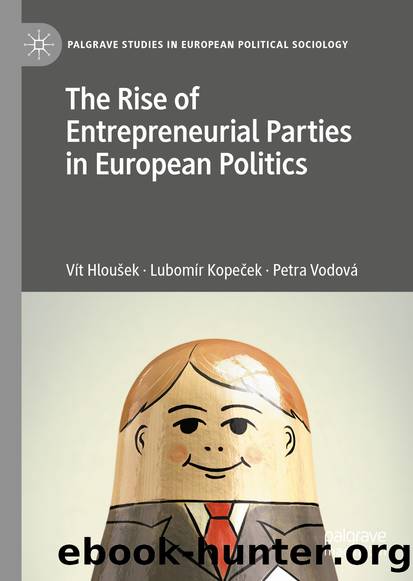The Rise of Entrepreneurial Parties in European Politics by Vít Hloušek & Lubomír Kopeček & Petra Vodová

Author:Vít Hloušek & Lubomír Kopeček & Petra Vodová
Language: eng
Format: epub
ISBN: 9783030419165
Publisher: Springer International Publishing
Election
National 2012
European 2014
National 2016
European 2019
Percentage of the votes
8.6
7.5
11
5.3
Number of seats
16
1
19
1
Source: Statistical Office of the Slovak Republic
The Platform of Independent Personalities and the Family Business Background
The importance, and indeed the irreplaceability, of the leader, typical of OĽANO’s public performance, is thrown into sharp relief when we look at the party’s organisation. At the time of OĽANO’s registration, Slovak law placed virtually no demands on political party organisation, and this allowed Matovič to pursue a minimalist approach. This reflected the founding father’s aversion to political parties and also provided him with a powerful position in OĽANO as well as control over the whole project. The extremely brief OĽANO statutes—comprising 11 short articles—considered only two aspects: the chair and the congress. The statutes allowed Matovič, in the role of party chair, to act in any matter not reserved for the congress. The congress, comprising all OĽANO members, was described in the statutes as the movement’s supreme organ, but the only powers explicitly granted to it were to appoint and remove the chair, and to approve the party’s programme (Stanovy OĽANO 2011). Testifying to this body’s insignificance for Matovič was his comment that it was not this organ that was the congress—it was ‘the parliamentary election every four years’ (Leško and Lehuta 2015). The statutes mentioned no other party body, or the parliamentary party, MPs or territorial party branches, which were not created.
Crucial for understanding OĽANO’s party procedures are its closed character and the fact that it had only four members: Matovič and his three co-founders. The statutes ensured this seclusion by stating that a new member may be accepted only with the consent of the chair or the congress. In practice, the exclusivity of this four-member party allowed for informal decision-making, where the leader had the main say. Throughout the 2010s, this small circle around Matovič worked harmonically and there was no visible discord. Although the OĽANO statutes did mention the party’s sympathisers, the party did not attempt to organise them systematically, and their role was marginal. The party structure therefore provided no opportunity for a rival to the incumbent leader (Rybář and Spáč 2019).
Also very important for the OĽANO organisation and the leader’s supreme position were its symbiosis with Regionpress and Matovič’s family background in Trnava, a medium-sized Slovak city about 40 km from the capital, Bratislava. The party had no employees and, characteristically, until 2018 had its headquarters in the same building in Trnava as the main office of the media company, officially owned by Matovič’s wife. The mutual links were clear: Regionpress owned several internet domains, including igormatovic.sk and olano.sk, which it leased to the party. Matovič himself had a trademark of the party’s name registered with the Industrial Property Office—there is a parallel to this in Andrej Babiš’s ANO in Czechia.
Matovič’s wife granted a large loan to OĽANO to conduct the 2012 election campaign. OĽANO funded further election campaigns from the state subsidies to political parties; however, the party also continued to use the options made available by Regionpress
Download
This site does not store any files on its server. We only index and link to content provided by other sites. Please contact the content providers to delete copyright contents if any and email us, we'll remove relevant links or contents immediately.
| Automotive | Engineering |
| Transportation |
Whiskies Galore by Ian Buxton(41996)
Introduction to Aircraft Design (Cambridge Aerospace Series) by John P. Fielding(33122)
Small Unmanned Fixed-wing Aircraft Design by Andrew J. Keane Andras Sobester James P. Scanlan & András Sóbester & James P. Scanlan(32796)
Craft Beer for the Homebrewer by Michael Agnew(18237)
Turbulence by E. J. Noyes(8040)
The Complete Stick Figure Physics Tutorials by Allen Sarah(7366)
The Thirst by Nesbo Jo(6934)
Kaplan MCAT General Chemistry Review by Kaplan(6930)
Bad Blood by John Carreyrou(6613)
Modelling of Convective Heat and Mass Transfer in Rotating Flows by Igor V. Shevchuk(6433)
Learning SQL by Alan Beaulieu(6282)
Weapons of Math Destruction by Cathy O'Neil(6267)
Man-made Catastrophes and Risk Information Concealment by Dmitry Chernov & Didier Sornette(6007)
Digital Minimalism by Cal Newport;(5750)
Life 3.0: Being Human in the Age of Artificial Intelligence by Tegmark Max(5551)
iGen by Jean M. Twenge(5409)
Secrets of Antigravity Propulsion: Tesla, UFOs, and Classified Aerospace Technology by Ph.D. Paul A. Laviolette(5369)
Design of Trajectory Optimization Approach for Space Maneuver Vehicle Skip Entry Problems by Runqi Chai & Al Savvaris & Antonios Tsourdos & Senchun Chai(5066)
Pale Blue Dot by Carl Sagan(4996)
